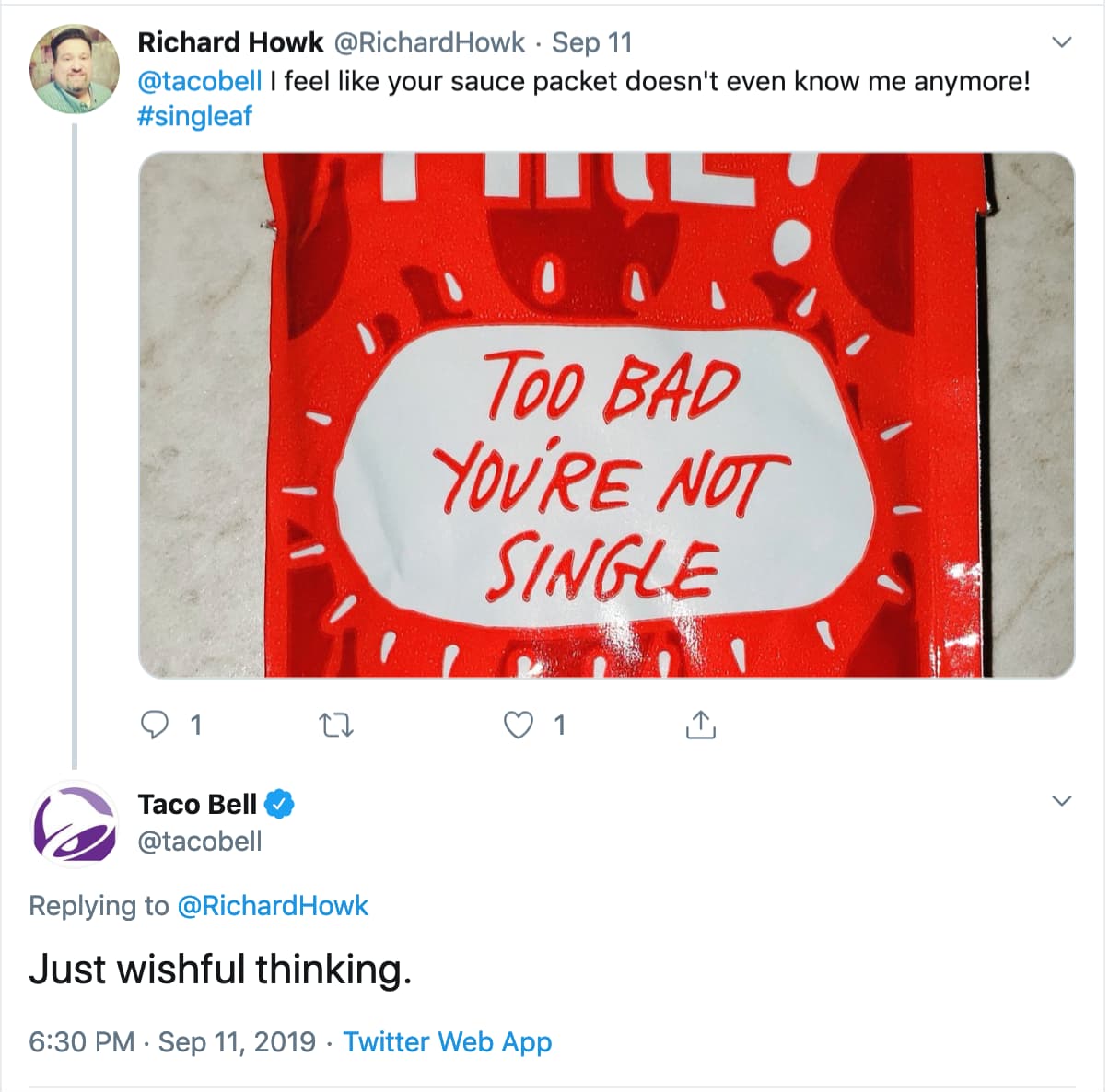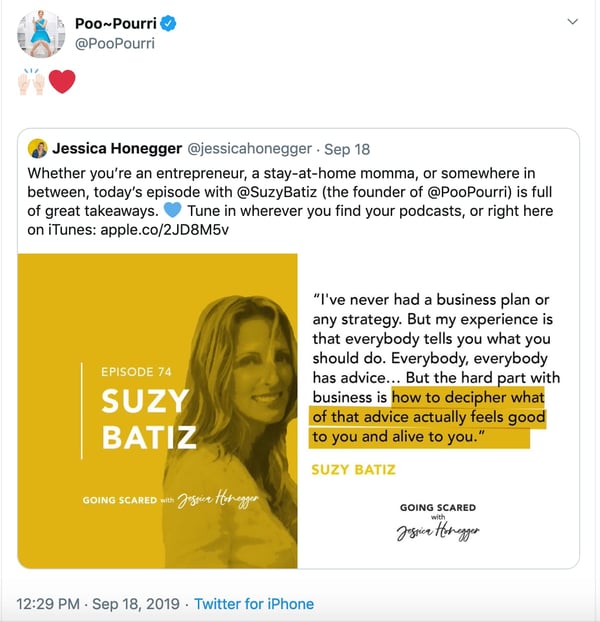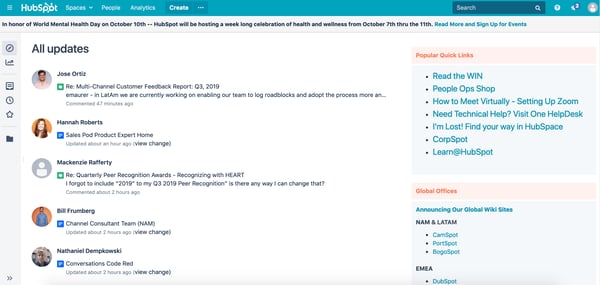Vanessa Carlton said it best: Your company is making its way downtown, faces pass, and you’re “success” bound. See what I did there? Anywho, your company is on its way. But how do you communicate that with your stakeholders and the public?
Between blog writing, drafting ad copy, and setting up an email workflow, it’s hard to make time for brand awareness and media management. That’s where a public relations (PR) agency can help.
According to the Public Relations Society of America (PRSA), “Public relations is a strategic communication process that builds mutually beneficial relationships between organizations and their publics.” In today’s world, PR and marketing overlap and intertwine, making it necessary to work together.
You might have questions about how your marketing team and a PR agency can work together like, “What will a PR firm do?” or “What services does a PR agency provide?”
Below, you’ll learn everything you need to know about hiring a PR agency.
What does a PR firm do?
A PR firm will handle the reputation of your company through owned, earned, and paid communications. Typically, public relations firms handle messaging to the press. The main goals of a PR firm are brand awareness and reputation management.
While the duties of public relations and marketing can overlap, the two serve different functions. Allie Decker, a writer on HubSpot’s pillar page team, wrote about public relations and marketing in this blog. She says, “The main goal of PR is to boost the reputation of your brand. On the other hand, the main goal of marketing is to drive sales.”
PR and marketing can work together by aligning their goals. For instance, people may become aware of your brand through PR tactics such as organic social media presence, and then convert into sales from your marketing tactics such as Facebook ads. With PR and marketing collaborating on strategic messaging, you’ll build your reputation and drive more sales.
Public Relations Services
- Reputation management
- Crisis management
- Media relations
- Social media
- Speech writing
- Press releases
- Event planning
- Outreach
- Market research
- Media training
- Internal copywriting
1. Reputation management
Reputation management is one of the main services that public relations firms offer. Tactics might include email newsletters, messaging on website copy or blog content, social media management, responding to reviews, and engaging with followers.
For instance, Taco Bell uses social media to build its reputation. In the example below, Taco Bell responds to a customer on Twitter with an authentic, engaging tweet making the brand relatable and boosting its reputation.

Image source: Twitter
2. Crisis management
According to data from PwC, 69% leaders have experienced at least one corporate crisis in the last five years — with the average number of crises experienced being three. Your company will most likely face at least one crisis during your tenure. That’s why you might have a PR firm come up with a crisis communication plan so you’re prepared when the time comes.
For example, Susan G. Komen for the Cure, a leading breast cancer charity, faced the consequences of lacking a crisis communication plan in 2012. They stopped funding Planned Parenthood’s breast cancer screenings after 7 years of funding. When the announcement was made by Planned Parenthood, the story went viral on social media with attacks coming from all sides. Komen waited a while to respond, put up a video failing to take responsibility, and then reversed the decision.
According to PRSA, there are many lessons to learn from Komen’s mistakes, including “Don’t position yourself as a victim. It won’t work.”
3. Media relations
One way to build your reputation and get your name out there is through the media. PR firms can handle the relationship between the media and your company. Tactics include writing pitches to journalists and influencers to attain mentions in industry news and get more media coverage.
For example, if you own a sustainable beauty company, a PR firm might pitch you to the Organic Bunny blog for an interview about sustainable beauty products.
4. Social media
Social media is a large factor in reputation management and one of the main ways to communicate with your audience, so maintaining your social media accounts can become a public relations tactic. Since you own your social media accounts they’re an easy way to build your brand. Plus, your social media strategy might involve engaging with influencers in your niche.
In the example below, Poo-Pourri uses its own social media account to boost its reputation and spread the word about an earned media opportunity. Also, note how the founder is active in the community, attains media coverage, and builds her company’s brand.

Image source: Twitter
5. Speech writing
Speech writing is a useful public relations tactic that you might use if your company holds press conferences and events or your employees speak at industry events. Any speeches given on behalf of your company should represent your brand as a whole. If anyone in your company has to give a speech, you might consider hiring a PR agency to handle the strategic messaging.
In the example below, Tim Cook, Apple’s CEO, and other members of his team, give several speeches about new products and updates during Apple’s annual innovation event. Apple may or may not have worked with a public relations firm, but this is a great example of an event where you might talk to a PR firm about the strategic and brand messaging.
6. Press releases
Your company might have to write a press release to announce new products, launches, campaigns, or movements. This tactic goes hand-in-hand with media relations. For example, if you work at a shoe company and want to start a movement on Twitter to #walkmore, a PR firm can write a press release to announce the campaign and hopefully attain media coverage.
7. Event planning
Event planning can be a marketing and public relations tactic to promote your brand, product, or service. If your company puts on an event for the purpose of boosting your brand reputation, you might consider working with a PR agency. A PR agency can help communicate with your stakeholders and publics, attain media coverage, and plan your event.
For example, INBOUND, an annual experience event for those in the marketing industry, is an event that is used to elevate the INBOUND brand. At this type of event, INBOUND provides value to the public, while also boosting its brand reputation. While this event is planned internally by INBOUND, it’s a good example of the type of event that a PR agency could help plan.
8. Outreach
Do you want to ensure your company is active in your niche’s community, including trade shows and events? A PR agency can help with that. Public relations firms use outreach as a tactic to boost brand reputation and increase brand awareness. For example, if you work at a fish store, your public relations firm might reach out to the Global Pet Expo to attain a booth at the event. Then, they might promote your involvement through social media, a press release, and media interviews.
9. Market research
The most important element to communicating and building relationships with your publics is to understand them. That’s why a PR firm would likely use market research as a tactic. They might use surveys, feedback forms, or focus groups to learn about your target audience. For example, if you own a protein company, a PR firm might send out surveys to see who buys your protein, what kind of flavors they want, and what they value in a protein company.
10. Media training
Many companies and brands in the public eye undergo media training. Media training is a tactic public relations firms use in order to produce consistent, strategic messaging for the brands they work with. If your company or brand will have several employees speaking in public, everyone should be on the same page in regards to messaging. If there is only one person who will be the face of your brand, it’s important to anticipate common reporter questions and have canned answers prepared.
In the example below, the Kardashians attend media training to practice answers to the most controversial questions reporters ask them. As a brand, the Kardashians have a lot of moving parts, and the family had never discussed or practiced the messaging they’d use when talking to the media.
11. Internal copywriting
Writing internal copy is a public relations tactic PR agencies use to communicate with employees. Your employees are a stakeholder and public of your company, so a PR firm could manage that relationship. You might need to communicate with your employees to discuss major changes, build morale, or celebrate successes.
Our tip from HubSpot is to have a main communication channel where communication is stored and disseminated. For example, HubSpot has an internal Wiki (see screenshot below), where our employees, who span seven countries, can communicate.
 Image source: HubSpot
Image source: HubSpot
Types of Public Relations Firms
- General strategic communication
- Press communication
- Crisis management
- Internal communication
- Community management
- Nonprofit public relations
- Public affairs public relations
The different types of PR firms vary depending on the services they offer and the publics they serve. There are general and specialized PR agencies.
1. General strategic communication
A general public relations firm will handle all aspects of your PR strategy. They will be responsible for building your reputation and brand awareness through many of the tactics described above, including social media, media relations, internal communication, and more. A general communication PR firm is a good fit for you if you need help with several public relations tactics.
2. Press communication
A PR agency that specializes in press communication will focus on media outreach, pitch writing, attaining media coverage, and getting interviews with journalists or influencers. If you only need to work with a PR agency in order to improve your media coverage, a specialized firm might be an option to consider.
3. Crisis management
A crisis management PR agency can strategize and implement a crisis communication plan. Typically these firms are used on a temporary basis, to either draft or implement a plan when your company experiences a crisis.
4. Internal communication
Internal communication PR firms specialize in disseminating information to your employees. Whether it be through a monthly newsletter or an internal hub, they will facilitate employee communication.
5. Community management
A community management PR firm focuses on managing customer relations. They will handle the communication between you and your community in places like Facebook Groups and social media.
6. Nonprofit public relations
A nonprofit PR firm specializes in working with specific organizations rather than focusing on certain tactics. Nonprofits will typically have different rules and regulations when it comes to communicating with its publics, which is why many firms specialize in nonprofit. A nonprofit PR firm will work with organizations in industries such as health, medical, or charity.
7. Public affairs public relations
Similar to a nonprofit firm, a public affairs PR firm specializes in working specifically with government officials as a communication tool. For example, if your company wants to endorse a political candidate or a government official wants to be a spokesperson for your company, a public affairs PR firm can manage that relationship.
How to Hire a PR Firm/Agency
- Set your objectives
- Create a budget
- Research PR firms
- Write a list of questions to ask
- Have meetings
- Set expectations
- Onboard your PR firm
1. Set your objectives
Now that you’ve decided to hire a PR agency, your next question might be something like, “How do I even start?”
To begin, start thinking about your goals. Answer questions like “What do I want to accomplish by working with a PR agency?” and “How can a PR agency help my company?” When you begin working with a PR firm, you’ll most likely draft SMART goals. SMART goals are specific, measurable, attainable, relevant, and time-bound.
Once you have an idea of your goals, our next tip is to think about what type of PR firm can help you meet those objectives (see types of PR firms above). For example, if your company has experienced a social media crisis like Komen (described above) you might want to work with a crisis management firm. On the other hand, if you work at a nonprofit charity foundation like the Red Cross, you might work with a nonprofit public relations agency.
2. Create a budget
Before you begin researching which PR agency you want to work with, create a budget. Consider how much you’re willing to spend on public relations efforts. You should be able to answer questions like “Will this come out of our marketing budget?” or “What percent of our budget can we contribute to PR?”
Megan Conley, a video editor/animator at HubSpot, writes about creating a budget in this blog. To create a budget, she says:
- Align your goals with your budget
- Consider hidden costs
- Remember your priorities (think of those SMART goals)
To get better at prioritizing your PR line items, download the PR Budget Template (included in the 8 Budget Templates to Manage Your Marketing Spend).
You can also check out the average 2019 rates for a PR agency below.
3. Research PR firms
With your goals and budget in hand, begin researching the right kind of PR agency you’ve decided to work with. Gather information on their reputation, reviews, cost, social media presence, testimonials, clients, etc.
Aja Frost, a senior SEO strategist and former writer for the Sales blog at HubSpot, writes about creative prospect research strategies in this blog. These same strategies can be applied to researching a PR agency.
Frost suggests:
- Look at their company’s job page: This will give you an idea of their current objectives and what tactics they’re focusing on. For example, are they developing a social media team or looking to hire an expert in crisis management?
- Look for strategic announcements: By researching for announcements, you can learn about initiatives, successes, new strategies, and their own brand reputation. It’s important to consider how they handle their own PR.
- Read the shareholder letter: This gives you an idea of their financial strength, unique value proposition, and accomplishments. You want to find a reputable PR agency to work with.
- Go on Glassdoor: Glassdoor is a great place to learn about employee reviews, company culture, and goals. This will give a good idea of their reputation.
4. Write a list of questions to ask
After thoroughly researching different PR agencies, create a shortlist to contact. Before you contact an agency, write down a list of questions to ask.
You’ll want to learn about:
- Price
- Experience/expertise
- Previous clients
- Prior successes
- Reviews/testimonials
See examples of questions to ask a PR agency below.
5. Have meetings
Armed with your questions, your next step is to have meetings with different PR agencies. Go through your list of questions and gather the information you need to make a decision. For these meetings, our tip is to pay attention to who you have chemistry with. It’s always easier to work with people who are adaptable and can have an intelligent conversation about your strategies. After your meetings, compare the proposals you receive, from price to strategy.
6. Set expectations
Once you’ve decided which PR firm you want to work with, ensure you’ve made your objectives and goals clear. Set up a clear line of communication, while also defining your expectations. Talk with your PR agency about your SMART goals and identify how you’ll measure success.
7. Onboard your PR firm
The final step to hiring a PR agency is to go through the onboarding process with them. Figure out who your main point of contact is and discuss your communication goals. Ask questions like, “How often will we touch base?” or “How will we track the results of our work together?”
Questions to Ask a PR Firm, Agency, or Rep
1. “Do you specialize in a certain industry?“
There are different types of PR firms (see examples above) that you might work with. Before you hire a PR agency, find out if they specialize in a certain industry or have only worked with certain kinds of businesses. This will give you an idea of how and if they can help your company.
2. “How will you get us media coverage?“
It’s important to find out what tactics the agency uses to gain media coverage. In addition, see if they mention their media list when they answer this question. Most PR agencies have a media list and have built relationships with people in the industry. Also, see if they have any new strategies or tactics that you haven’t heard of before, such as influencer marketing or guerilla marketing.
3. “How do you measure success?“
An important quality of any marketing or public relations agency is to be able to track ROI. Every agency should have a system in place for tracking results and analytics for their campaigns. Also, see what success looks like for them. Ask questions like “How have you tracked success for previous clients?”
4. “How do you plan to work with our marketing team?“
When you hire a PR agency, you should consider how they will work with your marketing team. The two go hand-in-hand, especially because some tactics might overlap. Ask questions like “How do you account for our marketing team when you plan a campaign?” or “How do you communicate what your agency is responsible for versus our marketing team?
5. “What do the first few months look like?“
Figure out how they plan to get started. Do they focus on market research in the first few months? How long would that take? It’s important to figure out how they get started with their clients and what their strategy would look like for your company.
6. “What’s your pricing structure?“
Of course, budget is one of the main points you want to inquire about. Learn about their pricing structure. Ask questions like “Do you price per project, per hour, or a retainer fee?” and “How often do you charge?” Affording your PR agency is the main priority.
7. “Can I see work you’ve done for businesses in my industry?“
Again, you want to see that they’ve had success with other businesses or brands in your industry. This tells you that they might have a media list they can contact right away. It also lets you know they can be successful for you, because they’ve done it before.
8. “Can I contact past clients?“
Once you know that a PR agency has seen success with other brands, ask for references. Ask previous clients questions like “Was [PR agency] enjoyable to work with?” and “How did they measure success for you?”
9. “Do your employees have experience working in marketing and sales as well?“
This is an important question to ask because your PR agency should understand how marketing, sales, and PR all work together to drive sales. If its employees have experience in marketing and sales, they will understand the context of how PR fits in your strategy.
10. Who would I be working with?
Ask about their systems. The PR agency you work with should have a communication plan in place. Figure out what their team structure is like. Will you have one point of contact, like an account manager? Or will you work with several people on the team depending on the project?
11. How can your company grow with us?
As your company grows, you want to have a PR agency that can understand your needs from startup to scale up. Ask if they’ve worked with brands of all sizes and see if they’ve worked with anyone from the startup to enterprise.
How much does PR cost? Average 2019 Rates
According to the 2019 Holmes Report, PR budgets and agency spend has been increasing. This year, the number of CMOs and CCOs who were managing budgets of more than $100 million reported PR has accounted for 31% of the budget. On the other hand, for companies with a budget between $75 million and $100 million, budgets dropped to 6%. For those handling a budget between $50 million and $75 million, PR has accounted for 17% of their budget.
Overall, the amount you pay for PR will vary depending on the services you need as well as by location. It’s also important to take into consideration that PR agencies offer many different pricing structures. Agencies can charge on an hourly, retainer, or project basis.
Ellie Flanagan, a senior corporate communications manager at HubSpot, says “The cost of hiring a PR agency can vary depending on the size of the firm and the types of services you”re looking for. Most agencies bill hourly against a retainer, which guarantees a certain amount of work each month. Those costs can be between $100-500 per hour per each person on the team, depending on the seniority of each team member. You can work with the agency to determine how much work is required and how experienced the team needs to be.”
During my research for this piece, I found the current average cost of public relations is about $3,000-5,000/month. Project-based costs tend to be lower, running at about $1,000.
For example, Paranoid PR charges anywhere from $1,450-5,000/month for a retainer fee, depending on the intensity of the ongoing support. They also offer per-project pricing, charging around $250-500 for individual projects or $750-1,250 for mini-campaigns, depending on the complexity of the projects.
On the other hand, PRA Public Relations offers pricing based on different level programs offering different levels of service. Their programs range from $2,500/month to $7,000/month.
Pitch PR offers a standard PR program costing $3,000. No other options were listed on their website.
Bridgeview Marketing offers several PR programs ranging from $2,500/month to $8,000/month.
A PR agency could be a great complement to your marketing efforts, drive more traffic to your site, and facilitate reputation management and brand awareness.
Want to learn more about public relations? Check out our ultimate guide.

